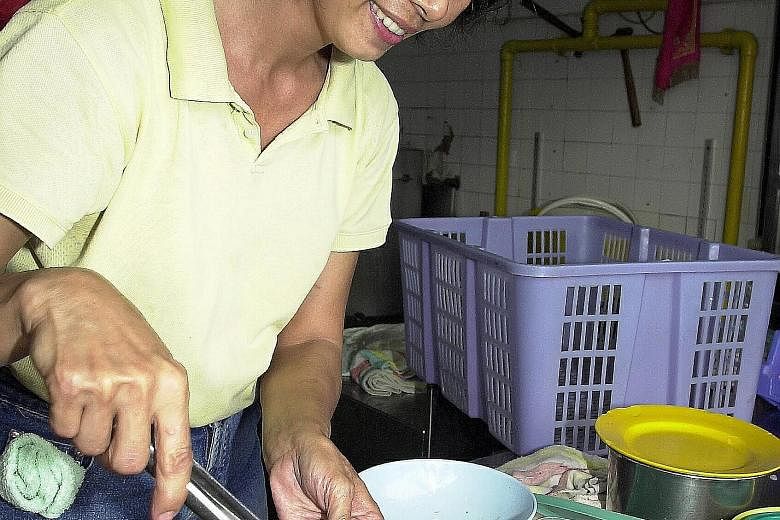Rather than take the risk of being held responsible for any casualties, food operators The Straits Times spoke to said they will take all Chinese-style raw fish dishes off the menu, and comply with any restrictions imposed by the National Environment Agency (NEA).
Mr Lim Meng Seng, who runs a porridge stall in Old Airport Road, has stopped selling raw fish porridge since July when the NEA issued an advisory against using song fish and toman fish - also known as the Asian bighead catfish and snakehead respectively - in dishes.
"We are not sure which suppliers adopt the correct cold chain management and handling practices so, to be safe, I will stop selling raw fish dishes completely," Mr Lim said. "I only sold about 20 to 50 dishes of yusheng porridge a day so it's not worth the risk."
Yesterday, the NEA held a briefing for operators of establishments that sell such Chinese-style raw fish dishes.
It advised them to stop the sale of all types of Chinese-style raw fish dishes, unless the fish come from suppliers that adopt proper cold chain management and hygienic handling practices.
These include transporting fish at temperatures lower than 5 deg C.
Fish meant to be eaten raw should also be packed in a hygienic environment and kept separate from raw fish meant for cooking, so as to avoid cross-contamination.
Fish at wet markets tend not to be separated in such a manner.
Country manager Sim Tharn Chun, 52, was hospitalised on Thursday last week after eating a raw fish dish at Tiong Bahru hawker centre. He was admitted to Khoo Teck Puat Hospital and remains in critical condition. The incident has put the safety of raw fish dishes back in the spotlight.
A Ministry of Health investigation into the spike in the number of Group B Streptococcus (GBS) infections earlier this year found a link between the consumption of Chinese-style raw fish dishes and the disease.
GBS are a common type of bacteria found in the gut or urinary tract of about 15 per cent to 30 per cent of adults, and do not usually cause disease in healthy people. But they may occasionally cause serious infections of the joints, brain, heart and blood.
Owners of food outlets which breach these regulations risk having enforcement action taken against them, which can range from fines of a few hundred dollars to revocation of their licences for repeated offences.
Ms Janet Goh, 50, who owns Hougang eatery Sin Heng Kee Porridge, said its profits had fallen by 10 per cent since it stopped selling raw fish porridge in August.
"I considered using alternative types of fish and customers keep pressing me to start reselling my raw fish dishes," she said. "I'm disappointed we can't sell these dishes any more... But we have no choice... as we have to put customers' safety first."
Most hawkers buy the fish for yusheng (raw fish) dishes at wet markets.
"Most fish sold at Singapore's general markets and fishery ports are intended for cooking, and should not be eaten raw," the NEA, Health Ministry, and Agri-Food and Veterinary Authority said in a statement yesterday.
Instead, the NEA has advised food stalls to purchase fish from suppliers able to prove the quality of the fish by providing a health certificate from the relevant authority of the country of origin. They added that, depending on the quality of the water that these fish were bred in or harvested from, they could be carriers of parasites or bacteria.
Raw fish meant for consumption "are typically bred in or harvested from cleaner waters", the statement said.
Correction: An earlier version of this story stated that Mr Sim Tharn Chun was a salesman. He is, in fact, a country manager. We are sorry for the error.

